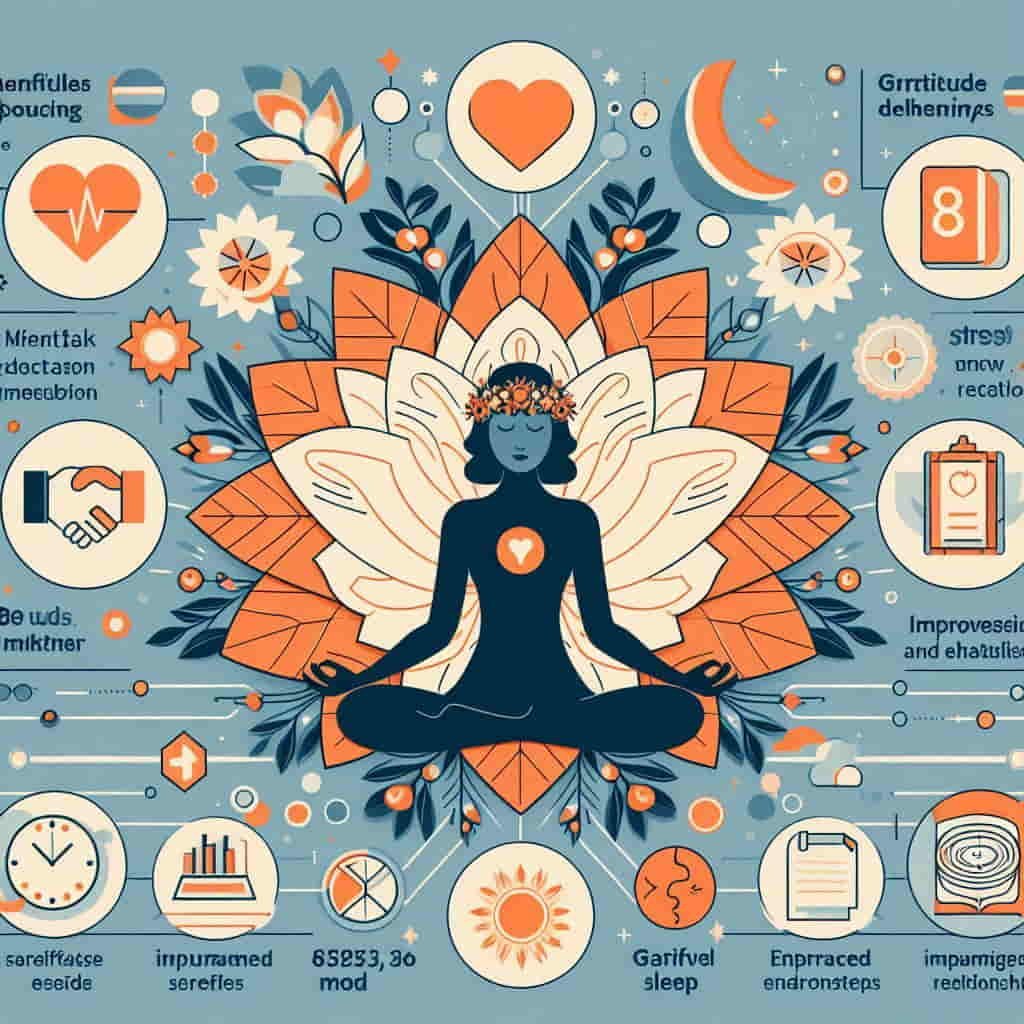TL;DR: Discover Inner Peace: Amir Khusrau’s Mental Health Wisdom
- Amir Khusrau’s quote about paradise on earth applies to mental health and mindfulness
- Staying present and practicing gratitude can significantly improve mental wellbeing
- Techniques like meditation and journaling help cultivate presence and appreciation
- Small daily actions to be more mindful can lead to major positive mental health shifts
- Embracing Khusrau’s wisdom allows us to find moments of “paradise” in everyday experiences
At a Glance
The famous quote in Persian language
“Gar firdaus bar-rue zamin ast, hamin asto, hamin asto, hamin ast”
by Persian poet Amir Khusrau translates to
“If there is paradise on earth, it is here, it is here, it is here.”
While originally describing the beauty of Kashmir [Kashmir is the northernmost geographical region of the Indian subcontinent], this profound statement holds deep relevance for mental health and mindfulness.

Discover the powerful impact of mindfulness on your mental health journey. © Copyright WisdomBread™
Now let’s explores how embracing Khusrau’s philosophy of finding paradise in the present moment can transform our mental wellbeing.
We’ll examine practical techniques to cultivate presence and gratitude, backed by psychological research.
By learning to appreciate the beauty in our everyday experiences, we can create our own “paradise on earth” – a state of inner peace and contentment.
A Moment of Paradise in an Unexpected Place
I never expected to find paradise in a crowded subway car during rush hour. Yet there I was, squeezed between strangers, when I suddenly felt an overwhelming sense of peace wash over me.
The day had started like any other – waking up late, rushing through my morning routine, and barely making it to the subway platform before the doors closed.
As I settled into my seat on the bustling train, jostled by the movement of the train, I found my mind racing with worries about past-due student loan, work deadlines, and personal obligations.
Then, almost involuntarily, I took a deep breath and really looked around me and started observing life’s moments on the train.
I found myself captivated by the diverse tapestry of human experiences unfolding around me.
Each passenger seemed to be in their own world, yet collectively they painted a vivid picture of life’s simple pleasures and everyday interactions.
The Joy of Reading
An elderly woman sat across from me, her weathered hands gently cradling a well-worn paperback.
Her eyes crinkled with delight as she turned each page, a soft smile playing on her lips.
The book appeared to be transporting her to another time and place, offering a momentary escape from the rhythmic clatter of the train.

An elderly woman immersed in a well-loved book on a train, radiating joy and tranquility as she escapes into her literary world. © Copyright WisdomBread™
Childlike Wonder
Near the front of the car, a young boy of perhaps five or six years old pressed his face against the window.
His eyes widened with excitement as he pointed out passing sights to his mother.
“Look, Mom! A red tractor!”
he exclaimed, his enthusiasm infectious.
The child’s unbridled joy at the world rushing by served as a poignant reminder of the magic we often overlook in our daily lives.

Witness the pure joy of discovery as a young boy marvels at the world passing by his train window, reminding us all to embrace life’s simple wonders. © Copyright WisdomBread™
Love in the Air
A few seats away, a young couple sat close together, their fingers intertwined.
They exchanged tender glances and whispered conversations, seemingly oblivious to their surroundings.
Their affection was palpable, a testament to the power of human connection amidst the anonymity of public transit.

A young couple shares a tender moment on the subway, their fingers intertwined, showcasing the beauty of love found in everyday life and the power of human connection. © Copyright WisdomBread™
The Soundtrack of Youth
Across the aisle, a teenage girl bobbed her head rhythmically, her AirPods Pro is delivering a private concert.
Her fingers tapped out the beat on her knee as she mouthed the lyrics to an unheard song.
Music seemed to be her refuge, a way to carve out a personal space within the crowded train car.

A teenage girl loses herself in music on a busy subway, demonstrating how technology and tunes create personal havens in public spaces. © Copyright WisdomBread™
As I continued to observe the additional vignettes of train life, I noticed other snapshots of humanity:
- A middle-aged man in a crisp suit furrowed his brow as he pored over financial reports, the stress of the workday evident in his posture.
- An artist sketched furiously in a notebook, her pencil flying across the page as she captured fleeting moments and faces.
- Two friends engaged in animated conversation, their laughter punctuating the ambient noise of the train.
- A tired nurse in scrubs dozed lightly, her head resting against the window as she caught a few moments of rest between shifts.
Each of these individuals contributed to the rich tapestry of human experience on display during this ordinary commute.
Their actions and interactions served as a reminder of the beauty and complexity of everyday life, often overlooked but always present for those who take the time to observe.
In that moment, I was struck by the simple beauty of everyday experiences unfolding around me.
Discover Paradise in the Everyday: Mindfulness Secrets Revealed
Suddenly, a vivid memory flashed through my mind, transporting me back to the early morning hours.
I recalled scrolling through my social media feed, my eyes still heavy with sleep and my vision slightly blurred. The soft glow of my smartphone screen illuminated my face in the dim light of dawn, as I lazily swiped through an endless stream of posts.
Amidst the digital noise in my social media feeds, a particular image and accompanying text caught my attention, its impact lingering in the recesses of my subconscious long after I had set my phone aside.
As I sat in the bustling subway car, the words that had captivated me earlier now resurfaced with crystal clarity, as if whispered directly into my ear by an unseen muse.
They were the timeless verses of Amir Khusrau, the renowned 13th-century Persian polymath whose brilliance as a poet, musician, and scholar had transcended centuries to touch my modern life.
His poetic declaration reverberated through the chambers of my thoughts, each word resonating with a profound sense of truth and beauty: “If there is a paradise on earth, it is this, it is this, it is this.”

Experience the transformative power of mindfulness as an ordinary subway ride becomes a glimpse of paradise, inspired by Amir Khusrau’s timeless wisdom. © Copyright WisdomBread™
The lilting cadence of the phrase seemed to dance in my mind, its rhythm perfectly matching the gentle sway of the subway car. The repetition in Khusrau’s words gained momentum with each iteration, like waves building upon one another.
It emphasized the profound beauty and wonder he must have witnessed, painting a vivid picture of a world so breathtaking that it could only be described as paradise incarnate.
As the phrase echoed in my mind, its cadence synchronized with the steady rhythm of my heartbeat.
It was as if the universe itself was urging me to open my eyes wider, to look beyond the mundane and discover the paradise that might be hiding in plain sight, even within the confines of this ordinary subway car.
This unexpected recollection served as a poignant reminder, gently nudging me to appreciate the beauty in my surroundings.
It whispered of the importance of seeking out moments of transcendent joy and recognizing the glimpses of paradise that can be found in our everyday lives, no matter how seemingly insignificant.
Though Khusrau had penned these words to describe the natural splendor of Kashmir, I realized with a start that his wisdom applied perfectly to this ordinary subway ride – and indeed, to life itself.
The scratched plastic seats, the diverse faces of my fellow passengers, the rhythmic clatter of the train on the tracks – all of it suddenly seemed imbued with a touch of the divine.
That brief moment of presence and appreciation shifted my entire perspective, like a kaleidoscope turning to reveal a new pattern of vibrant colors.
I had stumbled upon a profound truth about mental health and mindfulness – that paradise isn’t some far-off, unattainable place, but rather a state of mind we can access anytime, anywhere.

Witness the power of mindfulness as an ordinary New Jersey street transforms into a personal paradise, revealing the hidden beauty in our daily surroundings. © Copyright WisdomBread™
As I stepped off the subway and into the bustling streets of New Jersey, I carried with me a newfound appreciation for the world around me.
The rest of my day felt lighter, more joyful, as if I were walking on air.
Khusrau’s words had become a mantra, a key to unlocking the hidden beauty in every moment.
I realized that true paradise lies not in perfection, but in our ability to find wonder and joy in the imperfect, ever-changing tapestry of life.
The Wisdom of Khusrau: Finding Paradise in the Present
Amir Khusrau’s famous words about paradise on earth carry deep implications for our mental health.
While he was describing the physical beauty of Kashmir, the underlying philosophy speaks to a universal human truth – that true contentment comes from fully experiencing and appreciating the present moment.
This concept aligns closely with modern psychological research on mindfulness and gratitude.
Studies have consistently shown that people who practice mindfulness – the act of focusing on the present without judgment – experience lower levels of stress, anxiety, and depression.

Unlock the power of gratitude: A simple practice for profound mental health benefits. © Copyright WisdomBread™
Similarly, cultivating gratitude has been linked to increased happiness, life satisfaction, and overall mental health. Khusrau’s poetry encourages us to look for the extraordinary in the ordinary, to find moments of “paradise” in our everyday experiences.
This shift in perspective can be transformative for our mental health. When we train ourselves to notice and appreciate the small joys and beauties around us, we become more resilient to life’s challenges.
Moreover, this approach helps combat the “hedonic treadmill” – our tendency to quickly return to a baseline level of happiness despite positive or negative life changes.
By consistently finding joy and gratitude in our present circumstances, we can maintain a more stable and positive emotional state.
Embracing Khusrau’s wisdom doesn’t mean ignoring life’s difficulties or pretending everything is perfect. Rather, it’s about cultivating the ability to find moments of joy and peace even amidst challenges.
This balanced perspective is key to maintaining good mental health in the face of life’s inevitable ups and downs.
Transforming Mental Health Through Presence and Gratitude

Embrace the present moment and cultivate gratitude to reduce stress, manage anxiety, and boost overall mental wellbeing. © Copyright WisdomBread™
Incorporating Amir Khusrau’s philosophy into our daily lives can lead to significant improvements in our mental health. Here’s how presence and gratitude can transform various aspects of our mental wellbeing:
- Stress Reduction: By focusing on the present moment, we can break the cycle of worry about the future or rumination about the past. This mindfulness practice has been shown to lower cortisol levels and reduce overall stress.
- Anxiety Management: Appreciating the “here and now” can help put anxious thoughts into perspective. Gratitude practices have been linked to decreased anxiety symptoms in numerous studies.
- Depression Prevention: Finding joy in everyday experiences can combat negative thought patterns associated with depression. Gratitude journaling, in particular, has been shown to increase positive emotions and life satisfaction.
- Improved Self-Esteem: Regularly acknowledging the good in our lives can boost self-worth and confidence. This positive self-reflection counters the negative self-talk often associated with low self-esteem.
- Improved Relationships: Being present and expressing gratitude strengthens our connections with others. This social support is crucial for maintaining good mental health.
- Emotional Resilience: Cultivating the present and finding joy in small moments builds emotional resilience, helping us better cope with life’s challenges.
- Better Sleep: Mindfulness and gratitude practices have been linked to better sleep, which is essential for mental health.
- Reduced Substance Abuse Risk: Finding fulfillment in everyday experiences can reduce the desire to seek artificial “highs” through substance use.
By consistently applying Khusrau’s wisdom to seek paradise in the present, we can create a positive feedback loop that continually reinforces and improves our mental health.
This approach doesn’t replace professional mental health care when needed, but it can be a powerful complementary practice for overall wellbeing.
Actionable Tips: Creating Your Own Paradise
Incorporating Amir Khusrau’s wisdom into your daily life doesn’t require drastic changes.
Here are some practical ways to cultivate presence and gratitude:
Start a Gratitude Journal:
Each day, write down three things you’re grateful for. They can be as simple as a warm cup of coffee or a friendly smile from a stranger.
Practice Mindful Breathing:
Take a few minutes each day to focus solely on your breath. This simple meditation can help center you in the present moment.
Engage Your Senses:
Regularly pause to fully experience your surroundings. What do you see, hear, smell, taste, and feel right now?
Create a “Paradise Moment” Ritual:
Designate a specific time each day to find your moment of “paradise.” It could be during your morning coffee, on your commute, or before bed.
Express Appreciation to Others:
Make it a habit to genuinely thank people in your life. This not only spreads positivity but also helps you recognize the good in your world.
Limit Social Media:
Excessive social media use can fuel comparison and discontent. Set boundaries to stay more present in your real-life experiences.
Take Mindful Walks:
Go for short walks without your phone, focusing on the details of your environment.
Practice Mindful Eating:
For at least one meal a day, eat slowly and without distractions, savoring each bite.
Create a Gratitude Jar:
Write down moments of joy or gratitude on slips of paper and add them to a jar. Read through them when you need a boost.
Use Mindfulness Apps:
Apps like Headspace or Calm can guide you through short mindfulness exercises throughout the day.
Remember, the goal isn’t perfection but progress. Even small steps towards being more present and grateful can have a significant impact on your mental health over time.
Final Thoughts: Your Paradise is Here and Now
Amir Khusrau’s poetic wisdom reminds us that paradise isn’t a distant place or future state – it’s available to us right here, right now.
By cultivating the present and gratitude, we can transform our mental health and find moments of joy and peace in even the most ordinary circumstances.
This doesn’t mean ignoring life’s challenges or pretending everything is perfect.
Rather, it’s about developing the ability to appreciate the good that exists alongside the difficulties. It’s about finding that elderly woman’s smile on a crowded subway, or savoring the warmth of sunlight on your face during a busy day.
As we practice this mindset, we may find that our definition of “paradise” evolves.
Instead of seeking some idealized, perfect state, we learn to find contentment and beauty in the imperfect, ever-changing present.
This shift can lead to profound improvements in our mental health, relationships, and overall life satisfaction.
So the next time you find yourself stressed, anxious, or disconnected, remember Khusrau’s words.
Take a deep breath, look around, and ask yourself: “Where is the paradise in this moment?”
You might be surprised by what you find.
Sharable Quotes
“Paradise on earth isn’t a place you go, it’s a perspective you cultivate. Find the extraordinary in your ordinary moments.” ~ Neel Chatterjee
“Your mental health paradise isn’t in some distant future – it’s in the gratitude and presence you practice right now.” ~ Neel Chatterjee
Disclaimers: Always seek professional help when needed and the content is not a substitute for therapy.
Like, Subscribe, and Share: Please share your thoughts, feelings, and questions in the comments below.





